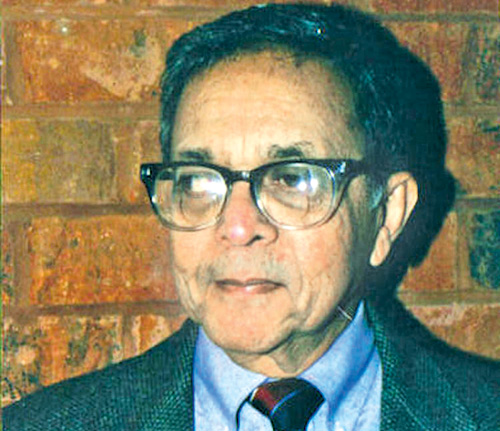Tribute to Ernest Corea:
Journalists rarely make good diplomats, but Deshabandu Ernest Corea who passed away in the USA last week, was an exception to the norm in every way. A former editor of both flagships of the Associated Newspapers of Ceylon Limited, the Daily News and the Sunday Observer, Corea later served as Sri Lanka’s envoy to the US and its northern neighbour Canada. This is a singular feat that no other journalist has accomplished and it is no secret that his excellent journalistic and English language skills came in handy in his career as a top diplomat.
Corea was one of the finest journalists to have helmed the CDN editor’s chair and was very much a part of the golden age of local journalism in which the likes of Tarzie Vittachi, Cecil Graham, Denzil Peiris, Harold Peiris and Mervyn de Silva shone with their dedication to uncovering and reporting the truth.
Born in Katunayake in 1932 to a family hailing from Chilaw and educated at Royal College, Colombo and the University of Ceylon (Peradeniya), Ernest joined the editorial staff of the Daily News right after university, eventually becoming its Chief Editor in 1966. He held this post until 1970, when he went on to become the editor of the Sunday Observer for one year. He also held the post of Chief Administrative Officer of the ANCL Editorial Departments.
After leaving Lake House, he worked for the prestigious Straits Times in Singapore published by Singapore Press Holdings (SPH) as Features Editor, Columnist and Editorial Writer. He also worked as a director of the International Development Research Centre in Ottawa, Canada. He was Chairman of the Commonwealth Select Committee on the Media and Development, and was a life-member of the Asia Society’s advisory group in Washington DC. He also worked as Senior Consultant at the Consultative Group on International Agricultural Research (CGIAR) Secretariat affiliated to the World Bank.
Career diplomats
He ventured into diplomacy on the invitation of President J.R. Jayewardene in 1978, as High Commissioner to Canada. Subsequently, he was Ambassador of Sri Lanka to the USA, Cuba and Mexico. (Incidentally, J.R., whose critics labelleled him as a friend of the USA, had a very close relationship with Cuban leader Fidel Castro). Ernest was a very good negotiator for trade and other deals – perhaps his journalistic background made him check and verify all the fine print in such agreements. Ernest is regarded as one of the finest non-career diplomats Sri Lanka has ever produced and all the career diplomats held him in high esteem.
It was during his tenure as Ambassador to the US that President Jayewardene made an official State visit to the US in June 1984, which included a Rose Garden reception by President Ronald Reagan. Ernest worked hard behind the scenes to make it happen and no other Sri Lankan President has had this honour. President Jayewardene also gifted a baby elephant (incidentally the symbol of Reagan's Republican Party) to the people of USA during this event, which was telecast live via a special satellite feed on Rupavahini. Organising this State visit was the highlight of Ernest’s diplomatic career of which eight years were spent as Ambassador to the US.
Journalism in his blood
At this time, LTTE separatism was raising its head in Sri Lanka and elsewhere and Ernest battled with lobby groups which were advancing that cause in Washington DC. In July 1983, Ernest convinced the US State Department to disassociate itself from a resolution passed by the Massachusetts House of Representatives calling for the divestment and withdrawal of all public funds and pension revenues from American business organisations in Sri Lanka. He is known to have uttered the famous remark “even rabbits don’t produce that fast” referring to a HR report by Amnesty International on Sri Lanka that was produced within just 10 days.
Ernest wrote two books ‘Non-Alignment – the dynamics of a movement,’ and ‘North-South: Beyond Dialogue’ which were regarded as definitive works on these subjects. He also authored a book on Sri Lanka titled “Beyond Conflict”.
But journalism was always in Ernest’s blood and immediately after his retirement from the diplomatic service, he joined In Depth News Analysis (IDN) as its Global Editor and a member of its editorial board. He was also a columnist and Co-editor of IDN’s current affairs magazine, Global Perspectives. He had a short stint as President of the Media Task Force of the Berlin-based Global Co-operation Council.
Another little known fact is that a young Ernest covered the first and last appearance of Prime Minister S.W.R.D. Bandaranaike at the United Nations in 1956, soon after Sri Lanka joined the UN. Tragically, SWRD was assassinated three years later.
Ernest leaves behind his wife Indra and two sons Lester and Andy and four grandchildren. His equally famous elder brother Vernon, a veteran Radio Ceylon and BBC broadcaster, passed away in the UK in 2002 at age 75.



Add new comment